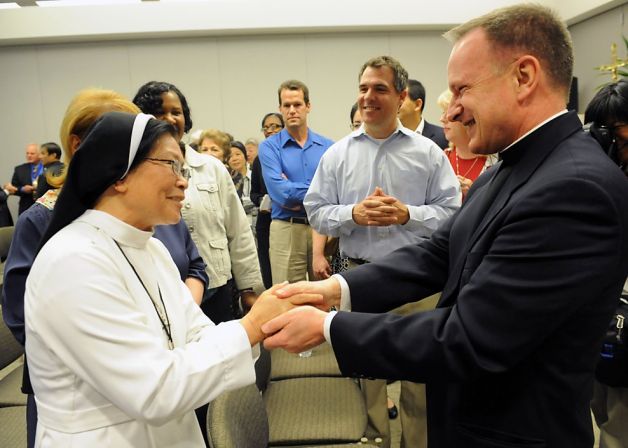Boston Priest Named Bishop of Oakland
By Matthai Kuruvila
Pope Francis named a Boston priest with longtime ties to the Bay Area as the bishop of Oakland, where the future bishop emphasized that he would lead a path more pastoral than political. Until now, Rev. Michael Barber had been the director of spiritual formation at a Boston seminary. In his first comments to diocesan staff in Oakland on Friday, Barber spoke of spending time in soup kitchens serving food, washing dishes, visiting jails and otherwise "getting my hands dirty." Barber, 58, is the first Jesuit bishop named by Francis, the first Jesuit pope. Oakland's bishop-elect said it was Francis' example he sought to follow, "to show, symbolically, that the church is there to serve the poor and the marginalized." The message is a notable contrast to that of his predecessor in Oakland, Salvatore Cordileone, the current San Francisco Archbishop. Cordileone has made the politics of marriage a central part of his leadership stretching back to his advocacy of Proposition 8, banned same-sex marriage in California. In the Catholic hierarchy, bishops run a diocese and often have auxiliary bishops to help them. It's extremely unusual for a simple priest, like Barber, to be named a bishop of a diocese. Barber will be the first non-auxiliary bishop to become Oakland's bishop when he is ordained by Cordileone on May 25. Barber said politics was not a driving concern for him. "I'm a pastor first," Barber said in an interview. "It's up to laypeople to lead political movements in the church, to be elected representatives. I'm here ... to bring the message of love and Christ." Cordileone was traveling and unavailable Friday. But he released a statement saying that he knew Barber "to be a man of keen intellect, unswerving integrity and great love for Christ and his Church." Taught in Menlo Park Barber, who was born in Salt Lake City and grew up partly in San Francisco as the child of Bay Area natives, taught at St. Patrick's Seminary in Menlo Park for eight years, directed the San Francisco Archdiocese's School of Pastoral Leadership and was a volunteer at San Quentin State Prison, where his brother was a chaplain. Barber also is a U.S. Navy captain. He was deployed to the Middle East in 2003 for the first months of the Iraq war, and he was also a chaplain to soldiers, prison guards and commanders at the U.S. Naval Base in Guantanamo Bay, Cuba. Barber will lead a diocese of approximately 550,000 people and 84 parishes in Alameda and Contra Costa counties. He will lead a diocese of great ethnic diversity - Mass is celebrated in 14 different languages, including Polish and Portuguese. Barber speaks Italian, French and Samoan. But Barber, who has virtually no administrative experience, is also taking helm of a diocese that is grappling with tremendous debt. The diocese built the $190 million Cathedral of Christ the Light in downtown Oakland with a missionary confidence that it could grow a faith tradition in an urban core. But the diocese still has $114 million in debt on the 5-year-old building, according to retired Archbishop Alex J. Brunett, who had been shepherding the diocese between bishops. Addressing the debt is critical to the diocese's future, Brunett said. "We don't want to be bogged down with raising money," he said. To make the adjustment to managing the diocese, Barber said that he would rely on the skilled staff in Oakland. But he also said that he would tap into many fellow Jesuits, who he said had a long track record of sound fiscal management. Unusual background Charles Hilken, a history professor at St. Mary's College in Moraga, said the elevation of someone with so many local ties harkened back to the church's ancient history, when such decisions were common. "There's something refreshing about that," he said. Members of religious orders - such as Dominicans, Jesuits or Franciscans - are underrepresented among Catholic bishops, Hilken said. The traditional path to bishop involves leading a parish at some point. Barber has been a teacher and a professor and has served in many other roles. He has been a pastor of a church once - from 1985 to 1987 in Western Samoa. That background makes him unusual as a bishop, Hilken said. "It is going to be a challenge, which means he was then picked for other reasons," Hilken said. "They must have seen some remarkable qualities in him to do that."
|
.
Any original material on these pages is copyright © BishopAccountability.org 2004. Reproduce freely with attribution.
